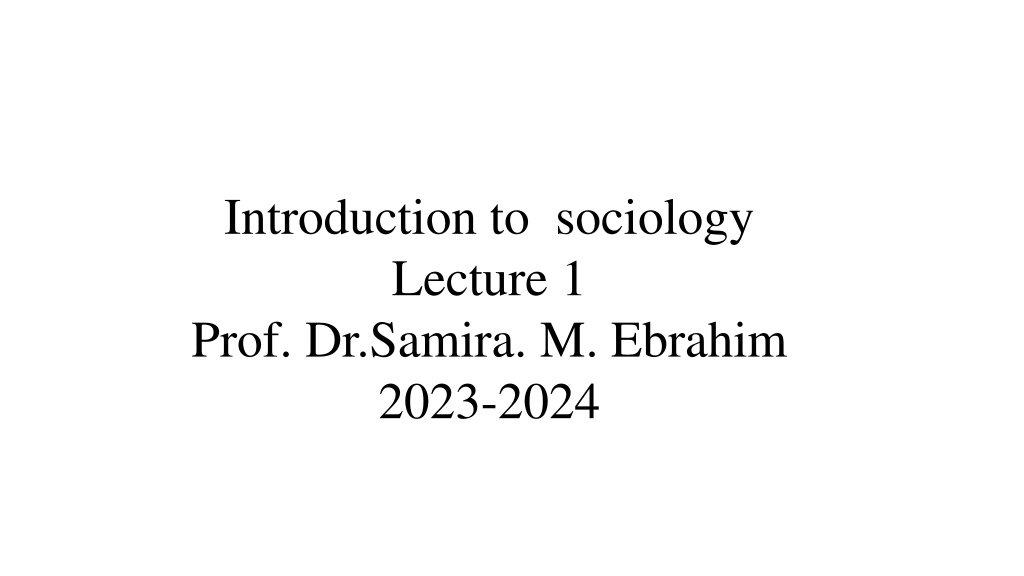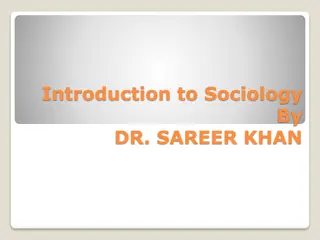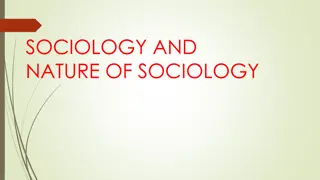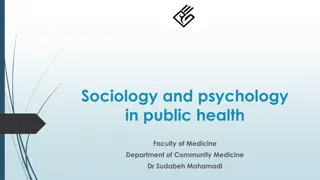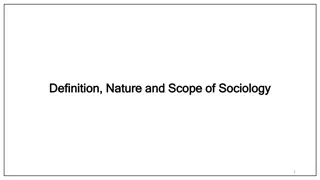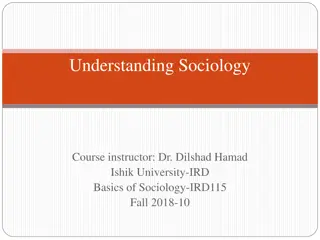Understanding Sociology: An Introduction to the Science of Society
Sociology is the scientific study of interactions and social groups, encompassing the nature of society, social relationships, and human behavior. Coined by August Comte, it evolved as a separate discipline from philosophy, focusing on social life and dynamics. This lecture covers the basic definitions of sociology, its objectives, and its relevance to professions like nursing and medicine. By exploring key concepts, students gain insights into social systems, groups, and actions.
Download Presentation

Please find below an Image/Link to download the presentation.
The content on the website is provided AS IS for your information and personal use only. It may not be sold, licensed, or shared on other websites without obtaining consent from the author. Download presentation by click this link. If you encounter any issues during the download, it is possible that the publisher has removed the file from their server.
E N D
Presentation Transcript
Introduction to sociology Lecture 1 Prof. Dr.Samira. M. Ebrahim 2023-2024
Objectives: At the end of the lecture the students will be able to : 1- Understand the basic definitions related to sociology 2- Understand the Concept, nature, and the goals of sociology. 3- Understand the relationship between sociology and nursing/ medicine professions.
Introduction to sociology The word Sociology derived from Latin word Societus means society , and the Greek word logos means Sociology is the Science of Society . study or science
Sociology: Sociology is the scientific and systematic study of interactions, societies and social interactions, from small and personal groups to very large groups. society: A group of people who live in a defined geographic area, who interact with one another, and who share a common culture groups and group
The term sociology was coined by August Comte, the French philosopher often referred to as the father of sociology. He introduced the word sociology for the first time in his famous work Positive Philosophy in about 1839.
Teaching of Sociology as a Separate Discipline Sociology is one of the youngest of the social science disciplines. It was earlier studied as a part of philosophy. With the development of modern science and scientific methods during the 18thand 19th centuries, there was a separation of sociology from philosophy and a closer association with the natural or physical sciences
The general concepts of sociology are as follows: Sociology is a science of society. Sociology is a science of social relationships. Sociology is the study of social life. Sociology is the study of human behaviour in groups. Sociology is the study of social action. Sociology is the study relationships. Sociology is the study of social groups or social systems of forms of social
NATURE OF SOCIOLOGY Sociology as a subject, which is the branch of social science, gives knowledge about society and its functions, and explains the nature of social activity, and that each society has different nature. The important characteristics of sociology are as follows: It is a purely independent science. It is a social science with no definite normative discipline. It is a pure science and not a practical science. It is more or less an abstract science and not a concrete science.
Culture The term culture refers to the group s shared practices, values, and beliefs. Culture encompasses a group s way of life, from routine, everyday interactions to the most important parts of group members lives. It includes everything produced by a society, including all the social rules.
Sociological imagination Sociologists often study culture using the sociological imagination, which pioneer sociologist C. Wright Mills (1959)described as an awareness of the relationship between a person s behavior and experience and the wider culture that shaped the person s choices and perceptions. It s a way of seeing our own and other people s behavior in relationship to history and social structure. Whatever we undergo as individuals (and this applies to emotions, pain, disease and surroundings have either helped create, or are affected by, these experiences cognition) our social
Why to study sociology Studying sociology is beneficial both for the individual and for society. By studying sociology people learn how to think critically about social issues and problems that confront our society. The study of sociology enriches students lives and prepares them for careers in an increasingly diverse world. Society benefits because people with sociological training are better prepared to make informed decisions about social issues and take effective action to deal with them
IMPORTANCE OF SOCIOLOGY IN NURSING Sociology plays an important role in the area of health sciences. Medicine and nursing have the common goal of prevention and restoration of health. However, the primary role of medicine comprises diagnosis and treatment, that is, the cure process. In contrast, the primary role of nursing lies in the care process consisting of caring, guiding. comforting, and
Nurses play a significant role in health-care profession. They are the key persons, who have significant influence over the members of the society. They have to work for the maintenance of healthier lifestyles and high standards of living. Sociology is closely related to personal and community health. Specialized branches of sociology, such as medical sociology and hospital sociology, have come into existence, and these emphasize the importance of sociology in the area of health.
The study of sociology is important for nurses due to the following reasons: Sociology helps understand those forces and pressures which affect patients adversely. It helps the nurses understand the behaviour, conflicts, interpersonal relationships, hierarchy, groups, adaptation, and so on, of different people working in hospitals or health institutions. Through sociology, the nurse gets information about the socio- cultural life of the patient. This is important for the planning and implementation of the treatment.
With the help of sociology, we can study the structure of family, community, and society, on the basis of which health organizations are made and services distributed. Thus, medical sociology is useful for comprehensive health services. With the help of sociology, the nurses can understand the characteristics of social relationship, its complexities, and its impact on health care. Sociology helps in the understanding and eradication of social problems. By the study of sociology, the nurses learn the techniques of adjustment that can be used in nursing
Medical sociology is a specialized branch of sociology which studies health, healthy behaviour and health institutions. Previously, disease and its treatment were considered the problems of medical sciences alone, but medical sociologists have declared that in diseases and health problems, the role of social and psychological factors is very significant. Similarly, it is very important to find out the role of behavioural and cultural factors in the causation of diseases.
Uses of Medical Sociology To estimate the rural health status of the individual and the community. To find out the social factors in the causation of communicable diseases like sexual diseases, TB/AIDS, and so on. To find out the customs, traditions, beliefs, and other cultural patterns that affect the health of a particular community. To establish the interdependence of medical and social sciences.
The meaning of social pathology is to understand conditions, such as poverty, crime, beggary, and so on. The study of diseases and social factors responsible for their causation may also be included in this. The study and survey of accidents, heart diseases, diabetes, asthma, cancer, and so on, come under the subject matter of social medicine
Understanding medical sociology helps nurses to estimate the health status of the individuals and the community, and also to find out the social factors that result in spread of communicable diseases, such as sexually transmitted diseases, tuberculosis, AIDS, and so on; to learn the customs, traditions, beliefs, and other cultural patterns that affect the health of a particular community; to establish the interdependence of medical and social sciences; and to understand the meaning of social pathology, which is learning about the conditions, such as poverty, crime, beggary, and so on.
The communicable diseases, such as heart diseases, diabetes, asthma, cancer, and so on, come under the subject matter of social medicine. study and survey of accidents,
Quiz Answer the following : 1-Which of the following best describes sociology as a subject? a. The study of individual behavior b. The study of cultures c. The study of society and social interaction d. The study of economics 2. C. Wright Mills once said that sociologists need to develop a sociological __________ to study how society affects individuals. a. culture b. imagination c. method d. tool 3. A sociologist defines society as a group of people who reside in a defined area, share a culture, and who: a. interact b. work in the same industry c. speak different languages d. practice a recognized religion
